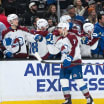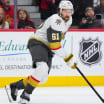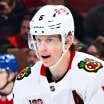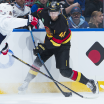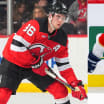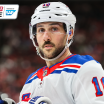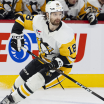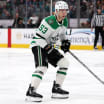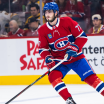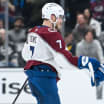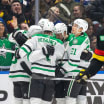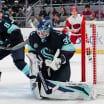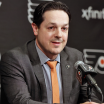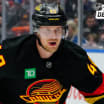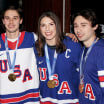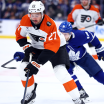Ron Francis held his first pro scouting meetings during the last week of January. The general manager of the NHL's newest team, soon to be called the Seattle Kraken, gathered the scouts in Seattle so they could get to know each other and start preparing for the 2021 NHL Expansion Draft.
Seattle NHL expansion team 'going to be ready' despite pandemic
At two-year mark, Kraken continuing to prepare for 2021-22 debut amid challenges
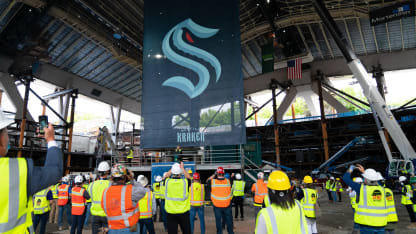
© Seattle Kraken
They had no idea what was to come.
Francis hasn't been to Seattle since. Instead of moving there in the first half of the year as planned, the former GM of the Carolina Hurricanes has worked from home in Raleigh, North Carolina.
Instead of watching the rest of the 2019-20 season live, the scouts sat through a pause of more than four months and watched the postseason remotely as it was played without fans in the stands in the hub cities of Edmonton and Toronto. They never got to see the end of the American Hockey League season. It was canceled.
"This year's just been …" Francis said, his voice trailing off. "You kind of roll with the punches."
This is 2020. The coronavirus pandemic has upended life in so many ways for so many people.
Uncertainty surrounds the 2020-21 season, including when it will start and how it will be played. An official start date for the season has not yet been announced. Uncertainty surrounds the expansion draft and 2021 NHL Draft too, including when and where they will take place.
Seattle wanted to host the drafts at its new home, a project now called Climate Pledge Arena with a price tag of about $1 billion, in June.
"Our hope was we could unveil this building and this team with the rest of the League here in Seattle," Kraken president and CEO Tod Leiweke said. "I think there are a number of things the League is sorting through. How is all of that going to work? When are people going to feel good about going back in and gathering in the numbers that would have initially hoped for? And I think we're realistic."
The Kraken have kept perspective and adapted to the situation.
"Those were a year ago really big issues," Leiweke said, referring to the drafts. "It's funny how things change."
It has been two years since the NHL announced expansion to Seattle on Dec. 4, 2018, and the team has made remarkable progress during the past year, despite the pandemic, in building an arena, a training center, a brand, an organization and a fan base.
Enthusiasm has not waned amid the pandemic. It has accelerated.
The Kraken unveiled their name, logo and colors July 23. Since then, they are second in sales to the Tampa Bay Lightning, the Stanley Cup champions, on NHLShop.com even though jerseys haven't been available, according to Brian Jennings, NHL senior executive vice president of marketing.
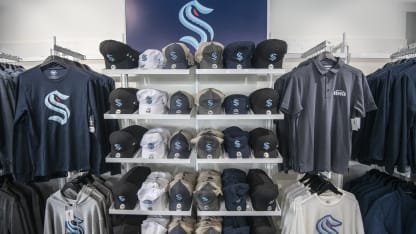
© Jim Bennett/Getty Images
After completing the club seat selection in person before the pandemic, the Kraken were to start general seat selection in March. They delayed it and started it remotely Aug. 11. Still, their overall rate of converting depositors to season ticket holders has been about 87 percent, according to Leiweke.
The waiting list has grown to more than 61,000. After completing general seat selection in early 2021, the Kraken will launch a tiered membership program to give everyone opportunities for access, including buying-single game tickets and attending practices.
"Certainly, there are challenges, but there are also unique opportunities," Leiweke said. "I think that our project in some ways has taken on more importance. People have desperately wanted things to look forward to, and I think that we're a symbol of that hope that at some point in time the world will return, and we will get back together, we will cheer, and this is a pretty cool thing in Seattle's future."
About 10 months remain until the Kraken will begin play, assuming the 2021-22 season begins on time. The arena and training center are on track to be completed on time, and the plan remains the same: a packed house on opening night in October 2021.
"Even those in government who have been cautious believe that by next fall, quote-unquote, our world should be back to normal," Leiweke said. "And we're going to be ready."
* * * * *
Leiweke has led several teams in his career, including the Minnesota Wild, the Lightning and the Seattle Seahawks of the NFL. He tries to build a strong culture within an organization and a strong connection to the community.
Well, how do you do that in a time of social distancing?
Seattle has had to interview, hire, and start working with people remotely. The only ones who have regularly gone into the office are construction executives, because the office is near the arena. Leiweke has held a couple of executive-level meetings in his backyard, where people could speak in person while socially distanced outdoors. That's about it.
"I often think about what that first staff meeting is going to be like," Leiweke said.
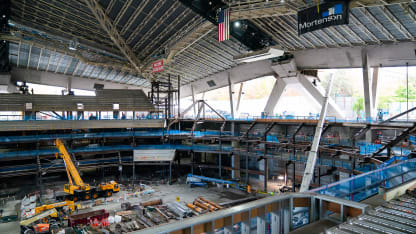
The Kraken now have more than 120 employees; Leiweke has not met many in person. That includes more than 30 in hockey operations; Francis has not met about half.
"I would say that it is frustrating more than it is actually difficult," said Katie Townsend, Kraken senior vice president of marketing and communications. "It's amazing how resilient people are, and I think the technology that we have makes a big difference."
The Kraken hold all-staff video conferences each Monday and Thursday morning. Senior leaders meet each Wednesday. The executive team meets each Friday.
"Do we have to add more Zoom calls to make decisions because we're not just passing each other in the office? Yes. Probably," Townsend said. "But I also think that from the top, Tod has been very determined that that culture that we were building wouldn't suffer."
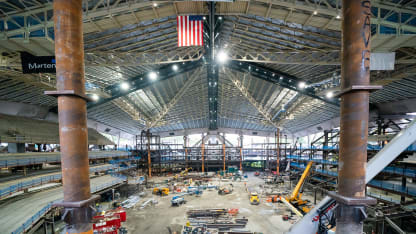
The Kraken have had guest speakers like Kim Davis, the NHL executive vice president of social impact, growth initiatives and legislative affairs, and Bill Cowher, who won the Super Bowl as coach of the Pittsburgh Steelers and is a friend of Francis'. They have established task forces on various subjects and given people opportunities to work on things they normally wouldn't.
Each Monday, Leiweke holds an optional open-door session. Anyone can pop in to chat about anything during the hour.
"I care a lot about the people who've joined us, and for any consternation I have, think about being somebody who has moved to a new city, who's taken a new job," Leiweke said. "How must they feel? And I think if we get accused of overcommunicating, so be it. But it's really making people feel connected, feeling they're part of this team, and we've got a lot of work going on."
The Kraken didn't have a set date to launch their brand, because they were waiting for the trademark resolution, but had tentative plans that included experiences for fans and large gatherings. Then came not only the pandemic, but social unrest. They wanted to make sure they were sensitive and not tone deaf.
When they launched their brand, they raised a five-story banner inside the arena for a group of socially distanced construction workers and broadcast it online. They have continued to connect with fans and sponsors online, from scavenger hunts to a virtual happy hour with Francis to a "Fansgiving" with radio broadcaster Everett Fitzhugh.
"We've kind of tried to work with technology," Townsend said. "'OK, we can do this on Twitter. We can do this on Instagram. We can do this via Zoom.'"
The Kraken opened a flagship store at Chandler's Cove near South Lake Union at the end of August. They had to start with scheduled appointments to balance the demand with the need for social distancing. That location alone has done $1.3 million in sales, Townsend said, and has added curbside pickup for the holidays. A pop-up store has opened in Bellevue.
"It's been incredible walking around and seeing people wearing the merch," Townsend said. "It's proved very popular, and we're thrilled by that."
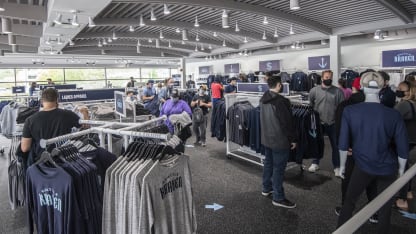
© Jim Bennett/Getty Images
* * * * *
The day after the NHL announced expansion to Seattle two years ago, the team held a groundbreaking ceremony in front of the former KeyArena next to the Space Needle. Leiweke emphasized this was not a renovation. The iconic roof built for the 1962 World's Fair would be preserved. A new arena would be built underneath.
About the time the NHL paused the 2019-20 season on March 11 due to concerns surrounding the coronavirus, the 44-million-pound roof was jacked up on steel supports, the old arena had been demolished and crews were almost finished digging out 600,000 cubic yards of dirt. Five miles away, ground had been broken on the three-rink training center.
Now the roof has been reattached, and the bowl of the new arena is taking shape. NHL Seattle, Oak View Group and Amazon announced June 24 it would be called Climate Pledge Arena and become the first zero-carbon arena in the world. It already had enhanced air filtration, because most of it is subterranean. Leiweke said that system has been bolstered further in response to the pandemic.
📍 Home. pic.twitter.com/g74mBNSBVs
— Climate Pledge Arena (@ClimateArena) December 2, 2020
The Kraken Training Center is taking shape too. The roof is up. Glass is going up. The rinks are outlined.
Construction stopped for only a few days before workers resumed with strict safely protocols. Leiweke said the first phase of the training center should open in June, the rest in August. He said the arena should open in late summer, or maybe early fall.
"I think that what we did is, we worked harder," Leiweke said. "A true testament to the men and women who worked on this project, getting out of bed every day, putting on a mask, practicing true safety standards. It's really an inspirational part of this story."
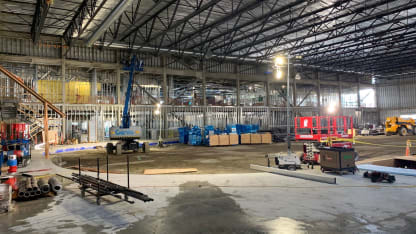
Francis has been sweating the details of the areas the team will use while working remotely in Raleigh. He said the design of the locker room was done, but the final look, down to the exact colors, probably would be wrapped up this week.
"Probably one of the more interesting things is sort of getting a knock on your door, and there's a package there, and you open it up, and it's carpet samples or tile samples or rubber samples or paint samples or wood samples," Francis said. "It's one thing to look at things on a computer. Until you actually see it in front of you, it's hard to make sure you're comfortable with making the decision you're making."
That's true of personnel too.
Francis now has full pro and amateur scouting staffs, but they don't have much hockey to watch and can't watch what there is live, with leagues in different situations around the world and travel restricted. When suspended leagues resume, seasons could be shortened, making evaluations more difficult and putting Seattle at a disadvantage.
"Everybody's dealing with that," Francis said. "It's not just us. But we probably have less data, background or information compared to other teams."
Francis has to hire support staff members, plus a coaching staff. He said in a perfect world, he would hire at least the coach before the expansion draft. But so much is unclear.
"Are there going to be any kind of changes to the expansion rules based on what we've been dealing with?" Francis said. "What are we going to do with the amateur draft? Are we going to go ahead as planned, or are there any thoughts of maybe some changes there? The expansion draft, the timing of that … I've got a lot of questions. We're just not at a point where we can get those answers yet.
"We just kind of look at the question and say, 'If it goes this way, what would we do? And if it goes that way, what would we do?' and try and be as best we can ready for the situation ahead."
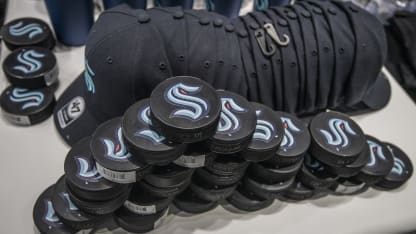
© Jim Bennett/Getty Images
The pandemic should give Seattle an advantage, however. The NHL salary cap will remain flat at $81.5 million until NHL hockey-related revenue surpasses $3.3 billion, according to the NHL/NHLPA Collective Bargaining Agreement. Though teams will be tight against the cap or internal budgets, the Kraken will have a clean slate.
"I do think a lot of the other teams and the GMs have had maybe more time than in the past expansion draft [for the Vegas Golden Knights in 2017] to sort of prepare their teams and the roster for it," Francis said.
"But I think the biggest thing for us is coming in with the cap space and how this is going to play out moving forward, not just for Year One but also looking down the road. I think it's important to look at Years Two and Three and make sure we manage that in the right way."
* * * * *
Two years ago, NHL Seattle's slogan was "RETURN TO HOCKEY." It recalled the rich hockey history of the city. The Seattle Metropolitans of the Pacific Coast Hockey Association made Seattle the first U.S. city to win the Stanley Cup when they defeated the Montreal Canadiens of the National Hockey Association in 1917.
"I'm looking forward to getting the Stanley Cup back in Seattle," Mayor Jenny Durkan said then.
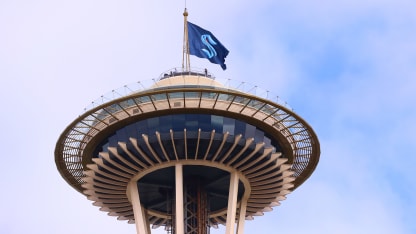
© Abbie Parr/Getty Images
Leiweke recalled the Metropolitans for another reason this week. The Metropolitans and Canadiens played for the Stanley Cup again in 1919, when the Metropolitans were still part of the PCHA and the Canadiens were part of the NHL in its second season. The Stanley Cup Final, tied 2-2-1 through five games, was canceled because of an outbreak of the Spanish flu.
"It's interesting, the connection between the Seattle Metropolitans and the global pandemic," he said. "The only Stanley Cup not concluded was because of what happened here in Seattle, and then we look about a hundred years later, hockey returns in a prolific way with a global pandemic central to its story. It's really quite amazing."
What happened after World War I and the Spanish flu pandemic?
"What then followed was the Roaring '20s, and people had this strong desire to get out and to celebrate," Leiweke said. "They did some crazy dances back in that day. You know, the world did return, and we believe it will again, and we're going to be ready."
Main photo courtesy of Seattle Kraken

